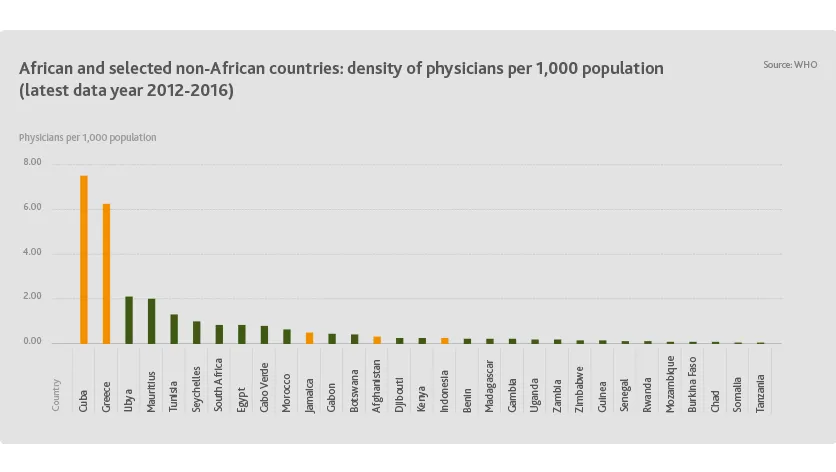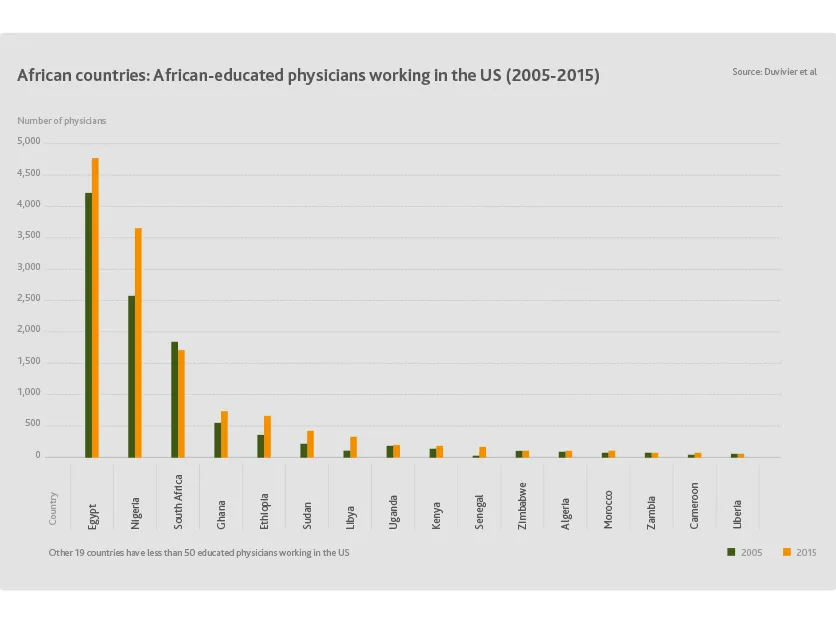Brain drain: a bane to Africa's potential
09 August, 2018
The opinions expressed in this article are solely those of the author, and do not necessarily reflect the opinions or views of the Mo Ibrahim Foundation.
Ahead of the 2018 International Youth Day, themed this year on creating 'Safe Spaces for Youth', let us take a moment to reflect on Africa’s brain drain, its impact on public service delivery, especially in the health sector, and the way forward in curbing this on a continent where over 60% of the population is aged below 25 years.
Brain drain, which is the emigration of skilled nationals, results in a depletion of skilled human resource in the countries of origin. The African Union estimates that about 70,000 skilled professionals emigrate from Africa every year. Currently, Africa is the world’s youngest continent, with an estimated 10 to 12 million young Africans joining the labour force each year. Yet the continent is able to create only about 3 million jobs annually. With limited economic opportunities, many young Africans are migrating to Europe and America for economic opportunities.
In 2016, the IMF’s World Economic Outlook reported a growing number of African migrants in OECD countries. Estimated at 7 million in 2013, the total number of African migrants in OECD countries could rise to 34 million by 2050. In 2013, France, the United Kingdom (UK), and the United States (US) hosted about 50.0% of the total sub-Saharan African diaspora. Africa’s Island countries are most impacted by this phenomenon, with almost one-third of Cabo Verde’s population and about 10.0% of Mauritius, São Tomé & Príncipe, and Seychelles' population living outside the country.
An obstacle to public service delivery in the health sector
The impact of brain drain is particularly pervasive when it comes to public service delivery in the health sector. In too many African countries, there are more locally born physicians residing outside their country than in it. This puts an enormous strain on public health delivery on the continent, especially considering that there are not enough physicians to attend to citizens in most African countries. According to WHO, the African average (calculated using the latest data year in the period 2012-2016 for 26 countries for which data is available at time of collection) is 0.45 physicians per 1,000 people.
Currently, only three African countries have at least one physician per 1,000 people: Libya, Mauritius and Tunisia, with a physician-to-population of 2.09, 2.00 and 1.29, respectively.

Meanwhile, in 2015, the number of African-trained International Medical Graduates (IMGs) practising in the US alone reached 13,584 – a 27.1% increase from 2005. This is equivalent to about one African-educated physician migrating to the US per day over the last decade. In 2015, 86.0% of all African-educated physicians working in the US were trained in Egypt, Ghana, Nigeria and South Africa.

On average, it cost each African country between $21,000 and $59,000 to train a medical doctor. Nine countries – Ethiopia, Kenya, Malawi, Nigeria, South Africa, Tanzania, Uganda, Zambia, and Zimbabwe – have lost more than $2.0 billion since 2010 from training doctors who then migrated. Annually, it is estimated that Africa loses around $2.0 billion through brain drain in the health sector alone.
Destination countries do not pay for the cost of training African doctors they recruit. For instance, one in ten doctors working in the UK comes from Africa, allowing the UK to save on average $2.7 billion on training costs. Similarly, the US, Australia and Canada save respectively about $846 million, $621 million and $384 million in training cost from African physicians they recruit. It is estimated that Africa has lost $4.6 billion in training cost for home-trained doctors, recruited by these four-top destination countries.
More action is needed to curb brain drain
As shown above, migration of skilled African nationals, especially young professionals, does not only result in the depletion of the continent's skilled manpower. Africa also loses billions of dollars in cost of training these people who then migrate to seek better opportunities elsewhere. This calls for urgent action to reverse this trend.
The African Union Migration policy framework (2018-2027) makes several recommendations on how to curb brain drain on the continent. These include generating gender-responsive economic development programmes to provide gainful employment, professional development, and educational opportunities to qualified nationals in their home countries. While African countries must put in place the necessary mechanisms to implement these recommendations, they will have to be complemented by adherence to meritocratic recruitment procedures, development of infrastructure and provision of incentive mechanisms to attract and retain highly qualified African nationals. Ultimately, as president Obama said in his recent visit to South Africa:
If we have African leaders, governments and institutions which are creating a platform for success and opportunity, then you will increasingly get more talent wanting to stay… Once you reach a tipping point, not only will you stop the brain drain, then it will start reversing.
Similarly, as President of the African Development Bank, Akinwumi Adesina remarked at the G7 Summit in 2017:
The future of Africa’s youth does not lie in migration to Europe; it should not be at the bottom of the Mediterranean; it lies in a prosperous Africa. We must create greater economic opportunities for our youth right at home in Africa.
By reversing the brain drain and creating safe spaces for young people to realise their potential, Africa will begin reap the benefit of its demographic bulge.



